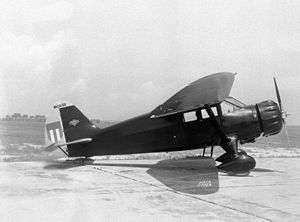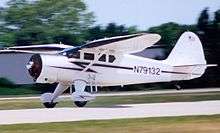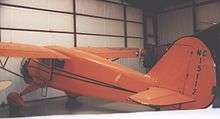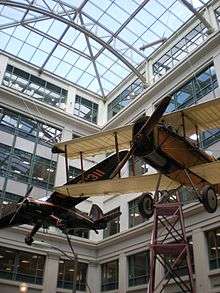Stinson Reliant
| Reliant | |
|---|---|
 | |
| Role | Liaison and training monoplane |
| National origin | United States |
| Manufacturer | Stinson Aircraft Company |
| First flight | 1933 |
| Primary user | United States Army Air Corps |
| Number built | 1327 |
|
| |
The Stinson Reliant was a popular single-engine four to five seat high-wing monoplane manufactured by the Stinson Aircraft Division of the Aviation Manufacturing Corporation of Wayne, Michigan.
Design and development
The Reliant is a three-place high-wing fixed tailwheel land monoplane powered with a variety of radial engines.[1]
1,327 Reliants of all types were made from 1933 to 1941, in different models, from SR-1 to SR-10. The final commercial model, the Stinson Reliant SR-10, was introduced in 1938. A militarized version was first flown in February 1942 and remained in production through several additional versions (all externally identical) until late 1943 for the US and British armed forces.
Reliant production can be broken into two distinct types - the straight wing Reliants (all models up to SR-6) and the gull wing Reliants (all models from SR-7 and after including the militarized V-77/AT-19) with there being little in common between the two groups of types. The straight wing Reliant had a wing of constant chord and thickness which was supported by two struts each side with additional bracing struts. In contrast the taper wing Reliant had the broadest chord and thickness of the wing at mid span, with the outer wing trailing edge heavily angled forward and a rounded cutout on the leading edge root, all supported by a single strut. The taper wing had a significant step up between the fuselage and the wing, and the changes in wing thickness gave it a distinct gull appearance from the front.
Operational history

The Reliant was used by the U.S. Army in World War II as a utility aircraft, designated UC-81, and as trainer designated AT-19. They were also used by the Royal Navy and Royal Air Force for light transport and communication duties. After the war they were sold on the civilian market as the Vultee V-77.
The V-77 was a spartan version of the SR-10 with the 300 hp Lycoming R680-E3B, a single door on the left side and the traditional "Bump" cowl was replaced with a simpler smooth cowl. Internal structure was beefed up significantly over the commercial models and a distinctive triangle shaped counterbalance was added to the rudder.
Variants

The SR-10 Reliant was available as a landplane, seaplane and skidplane in the following configurations:[2]
- Ambulance (2 Stretchers)
- Cargo/Ambulance
- Target Towing
- Firefighting
- Photographic
Civilian variants
- SR Reliant
- Powered by a 215 hp (160 kW) Lycoming R-680 radial piston engine.[3]
- SR-1
- Powered by a 240 hp (180 kW) Lycoming R-680-2 radial piston engine. Two built.[4]
- SR-2
- Powered by a 240-hp (179-kW) Lycoming R-680-7 radial piston engine.
- SR-3
- Similar to the SR-1, but with minor structural changes.
- SR-4
- Powered by a 250-hp (186-kW) Wright R-760-E radial piston engine.
- SR-5
- Improved version, powered by a 225-hp (168-kW) Lycoming R-680-4 radial piston engine.
- SR-5A
- Powered by a 245-hp (183-kW) Lycoming R-680-6 radial piston engine.
- SR-5B
- Powered by a 240-hp (179-kW) Lycoming R-680-2 radial piston engine.
- SR-5C
- Powered by a 260-hp (194-kW) Lycoming R-680-5 radial piston engine.
- SR-5E
- Powered by a 225-hp (168-kW) Lycoming R-680-4 radial piston engine.
- SR-5F
- Powered by a 250-hp (186-kW) Wright R-760-E radial piston engine.
- SR-6
- Five-seat cabin aircraft, powered by a Lycoming R-680-6 radial piston engine.
- SR-6A
- Four-seat cabin aircraft, powered by a 225-hp (168-kW) Lycoming R-680-4 radial piston engine.
- SR-6B
- Four-seat cabin aircraft, powered by a Lycoming R-680-5 radial piston engine.
- SR-7
- First gull wing series.
- SR-7B
- Five-seat cabin aircraft, powered by a Lycoming R-680-B6 radial piston engine. 47 built.[5]
- SR-7C
- Five-seat cabin aircraft, powered by a Lycoming R-680-B5 radial piston engine. Three built.[5]
- SR-8A
- Four-seat cabin aircraft.
- SR-8B
- Four-seat cabin aircraft, powered by a Lycoming R-680-B6 radial piston engine.
- SR-8C
- Four-seat cabin aircraft, powered by a Lycoming R-680-B5 radial piston engine.
- SR-8D
- Four-seat cabin aircraft, powered by a Wright R-760-E2 radial piston engine.
- SR-8DM
- Utility transport version of the SR-8D.
- SR-8E
- Five-seat cabin aircraft, powered by a 320-hp (239-kW) Wright R-760-E23 radial piston engine.
- SR-8DE
- Utility transport version of the SR-8E.
- SR-9
- 1937 series. Fitted with a curved windshield, unique to this series.[6]
- SR-9A
- Proposed version with Lycoming R-680-B4 engine. Unbuilt.[6]
- SR-9B
- Powered by a 245 horsepower (183 kW) Lycoming R-680-B6 engine. 35 built.[6][7]
- SR-9C
- Powered by a 260 horsepower (190 kW) Lycoming R-680-B5 engine. 65 built.[6][7]
- SR-9D
- Powered by a 285 horsepower (213 kW) Wright R-760-E1 engine. 22 built.[6][7]
- SR-9E
- Powered by a 320 horsepower (240 kW) Wright R-760-E2 engine. 43 built.[6][7]
- SR-9F
- Powered by a 450 horsepower (340 kW) Pratt & Whitney Wasp Junior radial engine. 34 built.[6]
- SR-10
- SR-10B
- Powered by a Lycoming R-680-D6. One built.[6]
- SR-10C
- Powered by a Lycoming R-680-D5 engine. 46 built.[6]
- SR-10D
- Wright R-760E-1 engine. 3 built.[8]
- SR-10E
- Powered by a Wright R-760E-2 radial piston engine. 21 built.[8]
- SR-10F
- Powered by a Pratt & Whitney R-985 Wasp Junior SB radial piston engine. 18 built.[9]
- SR-10G
- Powered by a Lycoming R-680-E1 radial piston engine. 12 built.[6]
- SR-10J
- Lycoming R-680-E3 engine. 11 built.[6]
- SR-10K
- Wright R-760E-3. Two built.[6]
Military variants
- AT-19
- USAAF designation for a training variant of the UC-81 for the Royal Navy under Lend-Lease as the Reliant I, 500 built.[10]
- AT-19A
- Original designation of the L-9A which was a Voyager not a Reliant.[10]
- AT-19B
- Original designation of the L-9B which was a Voyager not a Reliant.[10]
- AT-19C
- Conversions of AT-19s for photo-survey aircraft for the USAAF, 51 conversions.[10]
- UC-81
- Four impressed SR.8Bs.[11]
- UC-81A
- Two impressed SR.10Gs.[11]
- UC-81B
- One impressed SR.8E.[11]
- UC-81C
- Three impressed SR.9Cs.[11]
- XC-81D
- One civil SR.10F operated by the military for the development of glider pick-up techniques.[11]
- UC-81E
- Four impressed SR.9Fs.[11]
- UC-81F
- Seven impressed SR.10Fs.[11]
- UC-81G
- Three impressed SR.9Ds.[11]
- UC-81H
- One impressed SR.10E.[11]
- UC-81J
- Nine impressed SR.9Es.[11]
- UC-81K
- Five impressed SR.10Cs.[11]
- UC-81L
- Two impressed SR.8Cs.[11]
- UC-81M
- One impressed SR.9EM.[11]
- UC-81N
- Two impressed SR.9Bs.[11]
- L-12
- Two SR.5As impressed into service with the USAAF during World War II.[12]
- L-12A
- Two SR.7Bs impressed into service during World War II.[12]
- RQ-1
- One SR-5 Reliant was acquired by the US Coast Guard in 1935, later redesignated XR3Q-1 and decommissioned in 1941.[13]
- XR3Q-1
- One SR-5 Reliant was acquired by the US Navy in 1935.[14]
- Reliant I
- 500 Reliants were supplied to the Royal Navy under Lend-Lease. The Reliants were used for light transport and communications, navigation and radio training duties.
Operators
Military operators
- United States Army Air Forces - A total of 47 Reliants impressed during World War 2[17]
- United States Coast Guard[13]
- United States Navy[9]
Civil operators
- Aeronaves de México - the Reliant was the first aircraft used by Aeronaves, later to become Mexico's largest airline, Aeromexico, on their initial service between Mexico and Acapulco on 14 September 1934[18]
- Líneas Aéreas de Transporte Nacional (LATN)
Specifications (SR-10F)

Data from General Dynamics Aircraft and their Predecessors[9]
General characteristics
- Crew: one, pilot
- Capacity: 3 to 4 passengers
- Length: 27 ft 11 in (8.51 m)
- Wingspan: 41 ft 7 in (12.68 m)
- Height: 8 ft 6 in (2.59 m)
- Wing area: 256.5 sq ft (23.84 m²)
- Empty weight: 3,045 lb (1,384 kg)
- Loaded weight: 4,605 lb (2,093 kg)
- Powerplant: 1 × Pratt & Whitney Wasp Junior SB nine-cylinder air-cooled radial engine, 400 hp (298 kW)
Performance
- Cruise speed: 154 knots (177 mph, 285 km/h)
- Range: 739 nmi (850 mi, 1,369 km)
- Service ceiling: 21,000 ft (6,400 m)
- Rate of climb: 1,330 ft/min (6.8 m/s)
See also
- Related lists
- List of aircraft of World War II
- List of aircraft of the U.S. military, World War II
- List of aircraft of the RAF
- List of aircraft of the Fleet Air Arm
- List of military aircraft of the United States
- List of military aircraft of the United States (naval)
References
- ↑ Pilot's Flight Operating Instructions for Army Model AT-19 Airplanes and British Model Reliant - 15 June 1944
- ↑ Stinson SR-10 Specifications - April 1940
- ↑ Wegg 1990, pp. 131, 133.
- ↑ Wegg 1990, p. 132.
- 1 2 Wegg 1990, p. 135.
- 1 2 3 4 5 6 7 8 9 10 11 12 Wegg 1990, p. 136.
- 1 2 3 4 Aviation February 1937, p. 36.
- 1 2 Wegg 1990, pp. 136–137.
- 1 2 3 4 Wegg 1990, p. 137.
- 1 2 3 4 Andrade 1979, p.79
- 1 2 3 4 5 6 7 8 9 10 11 12 13 14 Andrade 1979, p.81
- 1 2 Andrade 1979, p.130
- 1 2 Pearcy 1991, p. 317.
- ↑ "A38 Stinson Reliant". RAAF Museum. 2009. Retrieved 20 January 2013.
- ↑ Halley 1980, p. 306.
- ↑ Swanborough and Bowers 1963, p. 532.
- ↑ Aeromexico - The Story of a Great Company, last accessed on 2012 November 30
- Andrade, John (1979). U.S.Military Aircraft Designations and Serials since 1909. Midland Counties Publications. ISBN 0-904597-22-9.
- Halley, James J (1980). The Squadrons of the Royal Air Force. Tonbridge, Kent, UK: Air Britain (Historians). ISBN 0 85130 083 9.
- Pearcy, Arthur (1991). U.S. Coast Guard Aircraft Since 1916. Shrewsbury, UK: Airlife Publishing. ISBN 1-85310-118-4.
- "Stinson Restyles". Aviation. Vol. 36 no. 2. February 1937. pp. 35–36. (registration required (help)).
- Swanborough, F. G.; Bowers, Peter M. (1963). United States Military Aircraft since 1909. London: Putnam.
- Swanborough, Gordon; Bowers, Peter M. (1976). United States Navy Aircraft since 1911 (Second ed.). London: Putnam. ISBN 0-370-10054-9.
- Wegg, John (1990). General Dynamics Aircraft and their Predecessors. London: Putnam. ISBN 0-85177-833-X.
External links
| Wikimedia Commons has media related to Stinson Reliant. |
- National Air and Space Museum, Smithsonian Institution
- Fleet Air Arm Archive
- Alberta Aviation Museum
- (1944) T.O. No. 01-50KA-1 Pilot's Flight Operating Instructions for Army Model AT-19 Airplanes, British Model Reliant
| ||||||||||||||
| ||||||||||